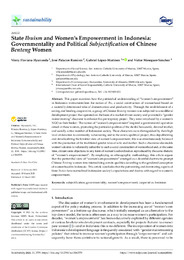Por favor, use este identificador para citar o enlazar este ítem:
https://hdl.handle.net/11000/30902Registro completo de metadatos
| Campo DC | Valor | Lengua/Idioma |
|---|---|---|
| dc.contributor.author | Hyunanda, Vinny Flaviana | - |
| dc.contributor.author | Palacios Ramírez, José | - |
| dc.contributor.author | López-Martínez, Gabriel | - |
| dc.contributor.author | Meseguer-Sánchez, Víctor | - |
| dc.contributor.other | Departamentos de la UMH::Ciencias Sociales y Humanas | es_ES |
| dc.date.accessioned | 2024-02-01T07:20:37Z | - |
| dc.date.available | 2024-02-01T07:20:37Z | - |
| dc.date.created | 2021-03-23 | - |
| dc.identifier.citation | Sustainability 2021, 13(6), 3559 | es_ES |
| dc.identifier.issn | 2071-1050 | - |
| dc.identifier.uri | https://hdl.handle.net/11000/30902 | - |
| dc.description.abstract | This paper examines how the patriarchal understanding of “women’s empowerment” in Indonesia instrumentalizes the notion of Ibu, a social construction of womanhood based on a societally determined idea of domestication and productivity. Through the establishment of a saving and lending cooperative, a group of Chinese Benteng women was subjected to a neoliberal development project that operated on the basis of a market-driven society and promoted a “gender mainstreaming” discourse to enhance this participatory project. They were introduced by a women’s NGO as their broker. The notion of “women’s empowerment” inspired a governmental operation aimed at these women, promoting the particular qualities of the dutiful housewife, devoted mother, and socially active member of Indonesian society. These characters were distinguished by their high level of devotion to community volunteering and to the state’s apolitical project, thus depoliticizing and deradicalizing the feminist view of women’s empowerment; this was simultaneously balanced with the promotion of the traditional gender roles of wife and mother. Such a discourse also molds women’s desires to voluntarily subscribe to such a social construction of womanhood and, at the same time, circumvents objections to any form of women’s subordination reproduced by the same rhetoric of “women’s empowerment”. By employing an ethnographic methodology, this article argues that the patriarchal view of “women’s empowerment” emerged as a deceitful doctrine to prompt Chinese Benteng women into internalizing certain qualities according to the gendered conception of womanhood in Indonesia. This article concludes that the patronizing and dominating aspects of State Ibuism have normalized Indonesian society’s expectations and desires with regard to women’s empowerment. | es_ES |
| dc.format | application/pdf | es_ES |
| dc.format.extent | 18 | es_ES |
| dc.language.iso | eng | es_ES |
| dc.publisher | MDPI | es_ES |
| dc.rights | info:eu-repo/semantics/openAccess | es_ES |
| dc.rights.uri | http://creativecommons.org/licenses/by-nc-nd/4.0/ | * |
| dc.subject | subjectification | es_ES |
| dc.subject | governmentality | es_ES |
| dc.subject | women’s empowerment | es_ES |
| dc.subject | cooperative | es_ES |
| dc.subject | feminism | es_ES |
| dc.subject.classification | Antropología Social | es_ES |
| dc.subject.other | CDU::3 - Ciencias sociales::31 - Demografía. Sociología. Estadística | es_ES |
| dc.title | State Ibuism and Women’s Empowerment in Indonesia: Governmentality and Political Subjectification of Chinese Benteng Women | es_ES |
| dc.type | info:eu-repo/semantics/article | es_ES |
| dc.relation.publisherversion | https://doi.org/10.3390/su13063559 | es_ES |

Ver/Abrir:
7. Sustainability.pdf
316,19 kB
Adobe PDF
Compartir:
 La licencia se describe como: Atribución-NonComercial-NoDerivada 4.0 Internacional.
La licencia se describe como: Atribución-NonComercial-NoDerivada 4.0 Internacional.
.png)